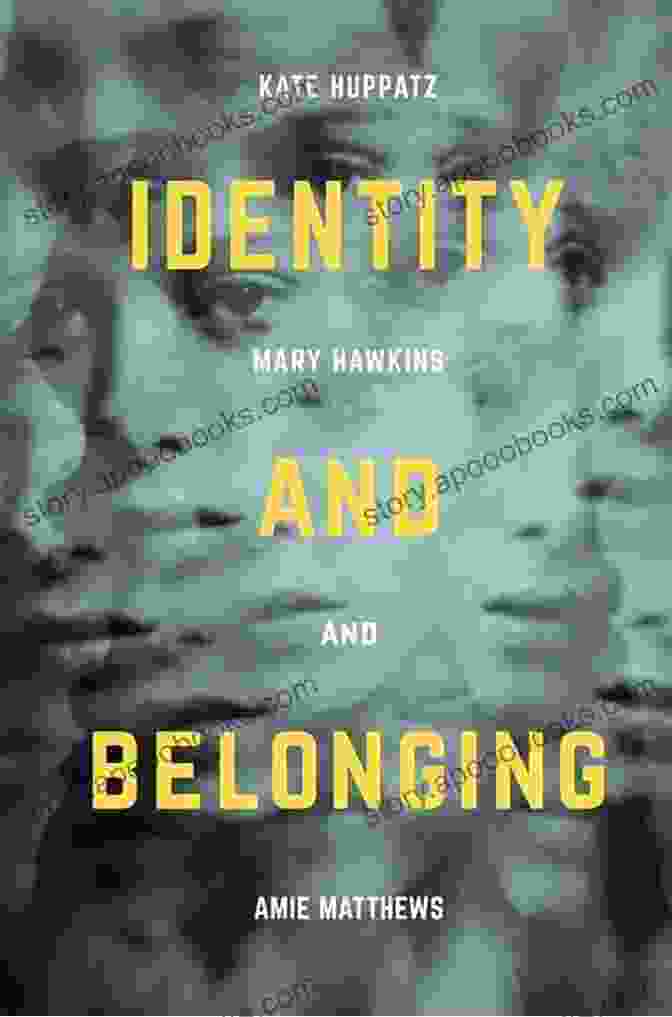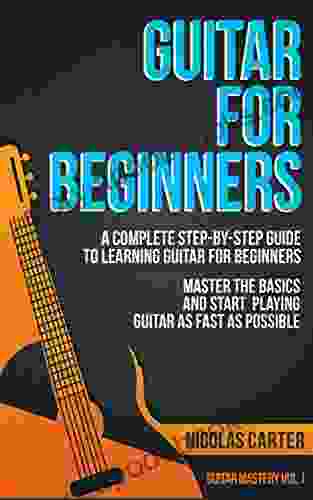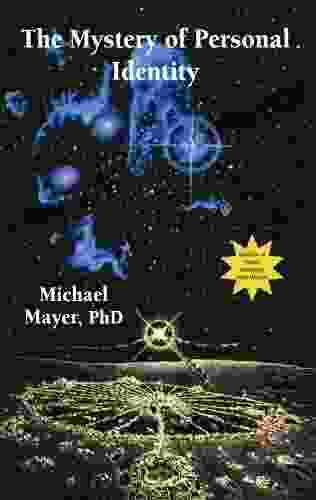The Mystery Of Personal Identity: Exploring the Essence of Self

5 out of 5
| Language | : | English |
| File size | : | 1100 KB |
| Text-to-Speech | : | Enabled |
| Screen Reader | : | Supported |
| Enhanced typesetting | : | Enabled |
| Word Wise | : | Enabled |
| Print length | : | 262 pages |
| Lending | : | Enabled |

The concept of personal identity is an intricate and enigmatic puzzle that has captivated philosophers, psychologists, neuroscientists, and individuals alike for centuries. It encompasses questions that probe the very core of our existence: Who are we? What makes us unique and distinct from others? How do we maintain a sense of self over time amidst the constant flux of our experiences?
In this article, we will embark on a captivating exploration into the mystery of personal identity. We will delve into the philosophical, psychological, and neurological perspectives that shed light on the nature of self, examining the intricate interplay between our physical bodies, mental processes, and social interactions. Along the way, we will encounter intriguing paradoxes, thought-provoking experiments, and existential questions that challenge our fundamental assumptions about who we are.
Philosophical Perspectives on Personal Identity
Philosophers have grappled with the concept of personal identity for millennia, offering a wide range of theories that attempt to unravel its enigmatic nature. One influential school of thought, known as substance dualism, posits that personal identity resides in an immaterial substance, often referred to as the soul or mind. This substance is distinct from the physical body and is believed to be the enduring essence of self that persists throughout our lives.
In contrast, materialists argue that personal identity is solely a product of our physical and biological composition. They contend that there is no separate, immaterial soul and that consciousness, memories, and other aspects of selfhood are emergent properties of the brain and central nervous system. This perspective emphasizes the importance of genetics, neural activity, and environmental factors in shaping our sense of self.
Another philosophical approach, known as bundle theory, suggests that personal identity is a collection of psychological properties, such as memories, beliefs, desires, and personality traits. These properties are said to be loosely connected and can change over time, resulting in a dynamic and evolving sense of self. This theory highlights the role of experiences, relationships, and self-reflection in shaping our ongoing identity.
Psychological Perspectives on Personal Identity
Psychologists have conducted extensive research to investigate the psychological factors that contribute to our sense of personal identity. One key area of focus is the role of memory in maintaining a cohesive sense of self. Autobiographical memories, which are personal recollections of our experiences and life events, play a crucial role in shaping our self-narrative and providing a sense of continuity over time.
Social psychologists have also explored the impact of social interactions and relationships on personal identity. Our interactions with others provide feedback and validation, helping us to define and refine our sense of self. Social roles, group memberships, and cultural norms can shape our self-perceptions and influence our behavior.
In recent years, cognitive psychology has shed light on the cognitive processes involved in self-referential thinking. Research suggests that we have a specialized neural network, known as the default mode network, which is active when we engage in self-reflection and introspection. This network allows us to think about our own thoughts, feelings, and actions, contributing to our sense of self-awareness and personal identity.
Neurological Perspectives on Personal Identity
Neuroscience has provided valuable insights into the neural underpinnings of personal identity. Brain imaging studies have revealed that specific regions of the brain, such as the prefrontal cortex and the hippocampus, are involved in self-related processing. These areas are associated with functions such as self-reflection, autobiographical memory, and decision-making, highlighting the intricate neural mechanisms that contribute to our sense of self.
Researchers have also investigated the effects of brain damage and neurological disFree Downloads on personal identity. Studies have shown that damage to certain brain regions can lead to profound disruptions in self-awareness, memory, and personality, raising questions about the neurological basis of our sense of self.
Additionally, neuroscience has explored the role of mirror neurons, which are specialized brain cells that become active when we observe others performing actions or experiencing emotions. These neurons are thought to contribute to our ability to understand the intentions and emotions of others, as well as to develop a sense of empathy and social connection, which can influence our self-perceptions and sense of identity.
Existential Questions and Personal Identity
The exploration of personal identity inevitably leads to profound existential questions that challenge our fundamental assumptions about ourselves and our place in the world. These questions delve into the nature of consciousness, the meaning of life, and the inevitability of death.
One of the key existential questions related to personal identity is the paradox of change. Our selves are constantly evolving and changing, yet we retain a sense of continuity and sameness over time. How is it possible to maintain a stable sense of identity amidst the constant flux of our experiences and the changes in our physical and mental states?
Another existential question arises from the concept of death. If our personal identity is inextricably linked to our physical bodies and our consciousness, what happens to our sense of self when our physical existence ends? Does our identity simply cease to exist, or is there a possibility for something more?
These existential questions highlight the tension between our desire for permanence and the transient nature of our existence. They challenge us to confront the limits of our knowledge and to reflect on the deeper meaning and purpose of our lives.
The mystery of personal identity is a fascinating and multifaceted concept that continues to captivate our minds and inspire exploration. Philosophical, psychological, and neurological perspectives provide valuable insights into the nature of self, revealing the complex interplay between our physical, mental, and social dimensions. As we continue to delve into this enigmatic realm, we gain a deeper understanding of ourselves, our place in the world, and the existential questions that shape our human experience.
May this exploration into the mystery of personal identity ignite within you a profound sense of wonder and curiosity, and inspire you to reflect on the nature of your own existence. Embrace the paradoxes, question the assumptions, and seek out the hidden threads that weave together the intricate tapestry of your self.
5 out of 5
| Language | : | English |
| File size | : | 1100 KB |
| Text-to-Speech | : | Enabled |
| Screen Reader | : | Supported |
| Enhanced typesetting | : | Enabled |
| Word Wise | : | Enabled |
| Print length | : | 262 pages |
| Lending | : | Enabled |
Do you want to contribute by writing guest posts on this blog?
Please contact us and send us a resume of previous articles that you have written.
 Book
Book Novel
Novel Page
Page Chapter
Chapter Text
Text Story
Story Genre
Genre Reader
Reader Library
Library Paperback
Paperback E-book
E-book Magazine
Magazine Newspaper
Newspaper Paragraph
Paragraph Sentence
Sentence Bookmark
Bookmark Shelf
Shelf Glossary
Glossary Bibliography
Bibliography Foreword
Foreword Preface
Preface Synopsis
Synopsis Annotation
Annotation Footnote
Footnote Manuscript
Manuscript Scroll
Scroll Codex
Codex Tome
Tome Bestseller
Bestseller Classics
Classics Library card
Library card Narrative
Narrative Biography
Biography Autobiography
Autobiography Memoir
Memoir Reference
Reference Encyclopedia
Encyclopedia Peter David
Peter David Laura Vanarendonk Baugh
Laura Vanarendonk Baugh Marcus Monteiro
Marcus Monteiro Ryan Bow
Ryan Bow Vanessa Nelson
Vanessa Nelson Randy Luethye
Randy Luethye Rita Willis
Rita Willis Ragemax
Ragemax Lauren Haley
Lauren Haley Lyndsay Johnson
Lyndsay Johnson Natalia Bonner
Natalia Bonner Stella Marie Alden
Stella Marie Alden Raphael Verkest
Raphael Verkest Mosab Abu Toha
Mosab Abu Toha Stephanie Land
Stephanie Land V N Datta
V N Datta Nicholas Drayson
Nicholas Drayson Michael Garlock
Michael Garlock M J Hardy
M J Hardy Shana Galen
Shana Galen
Light bulbAdvertise smarter! Our strategic ad space ensures maximum exposure. Reserve your spot today!

 J.R.R. TolkienUnlock the Secrets of ENT: Your Comprehensive Guide to the Ears, Nose, and...
J.R.R. TolkienUnlock the Secrets of ENT: Your Comprehensive Guide to the Ears, Nose, and... Allan JamesFollow ·6.9k
Allan JamesFollow ·6.9k Gene PowellFollow ·9.6k
Gene PowellFollow ·9.6k Louis HayesFollow ·11.1k
Louis HayesFollow ·11.1k Pat MitchellFollow ·2.4k
Pat MitchellFollow ·2.4k Kirk HayesFollow ·15.7k
Kirk HayesFollow ·15.7k Camden MitchellFollow ·12.8k
Camden MitchellFollow ·12.8k Howard PowellFollow ·6.9k
Howard PowellFollow ·6.9k Frank MitchellFollow ·3.7k
Frank MitchellFollow ·3.7k

 Jorge Luis Borges
Jorge Luis BorgesUnlock Your Inner Musician: The Ultimate Guide to...
Embark on a Musical...

 Carlos Drummond
Carlos DrummondQuick Reference Guide To Percussion Instruments And How...
Unleash your inner rhythm with...

 Roberto Bolaño
Roberto BolañoUnlock Your Guitar Potential: The Ultimate Guitar Mastery...
Are you ready...

 Fred Foster
Fred FosterLooking for Lady Dee: A Punk Rock Mystery
By [Author's Name] Looking for Lady Dee is...

 Jacques Bell
Jacques BellJourney into the Mystical Realm of "Heaven Polly Alice...
In the tapestry of literature, where...

 Julio Ramón Ribeyro
Julio Ramón RibeyroSixty Years of Hits: A Musical Journey Through Time
Music has the...
5 out of 5
| Language | : | English |
| File size | : | 1100 KB |
| Text-to-Speech | : | Enabled |
| Screen Reader | : | Supported |
| Enhanced typesetting | : | Enabled |
| Word Wise | : | Enabled |
| Print length | : | 262 pages |
| Lending | : | Enabled |










